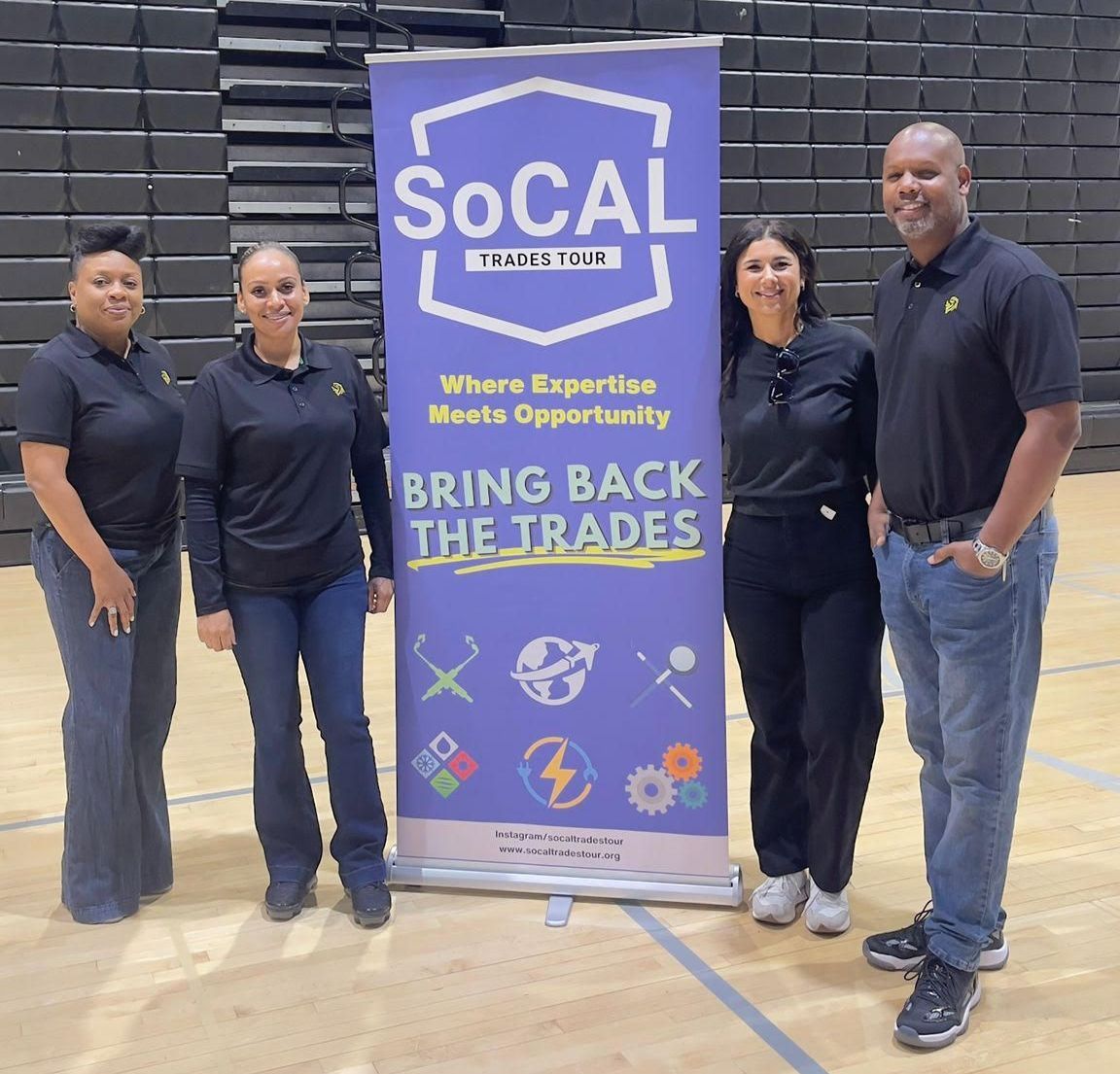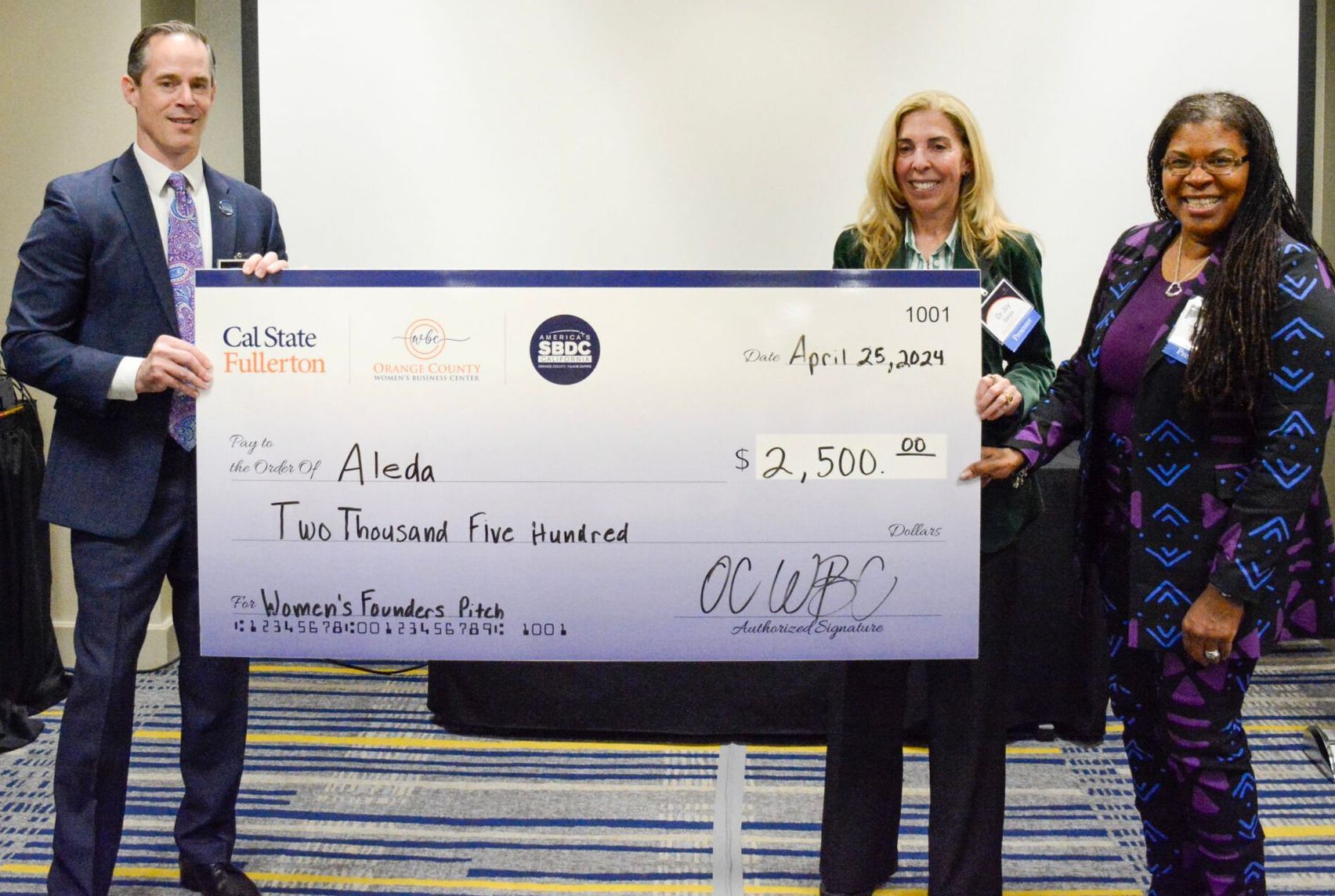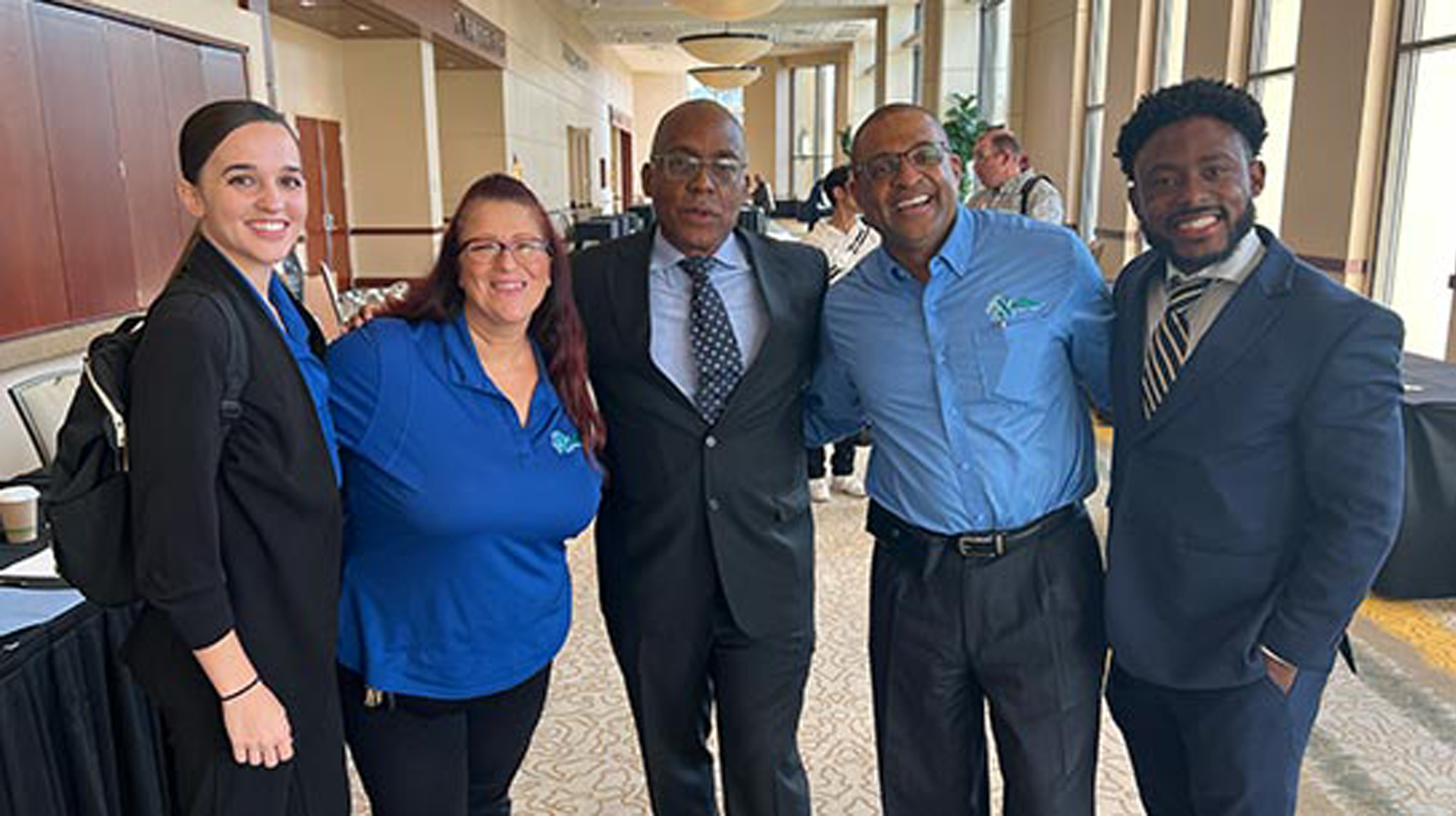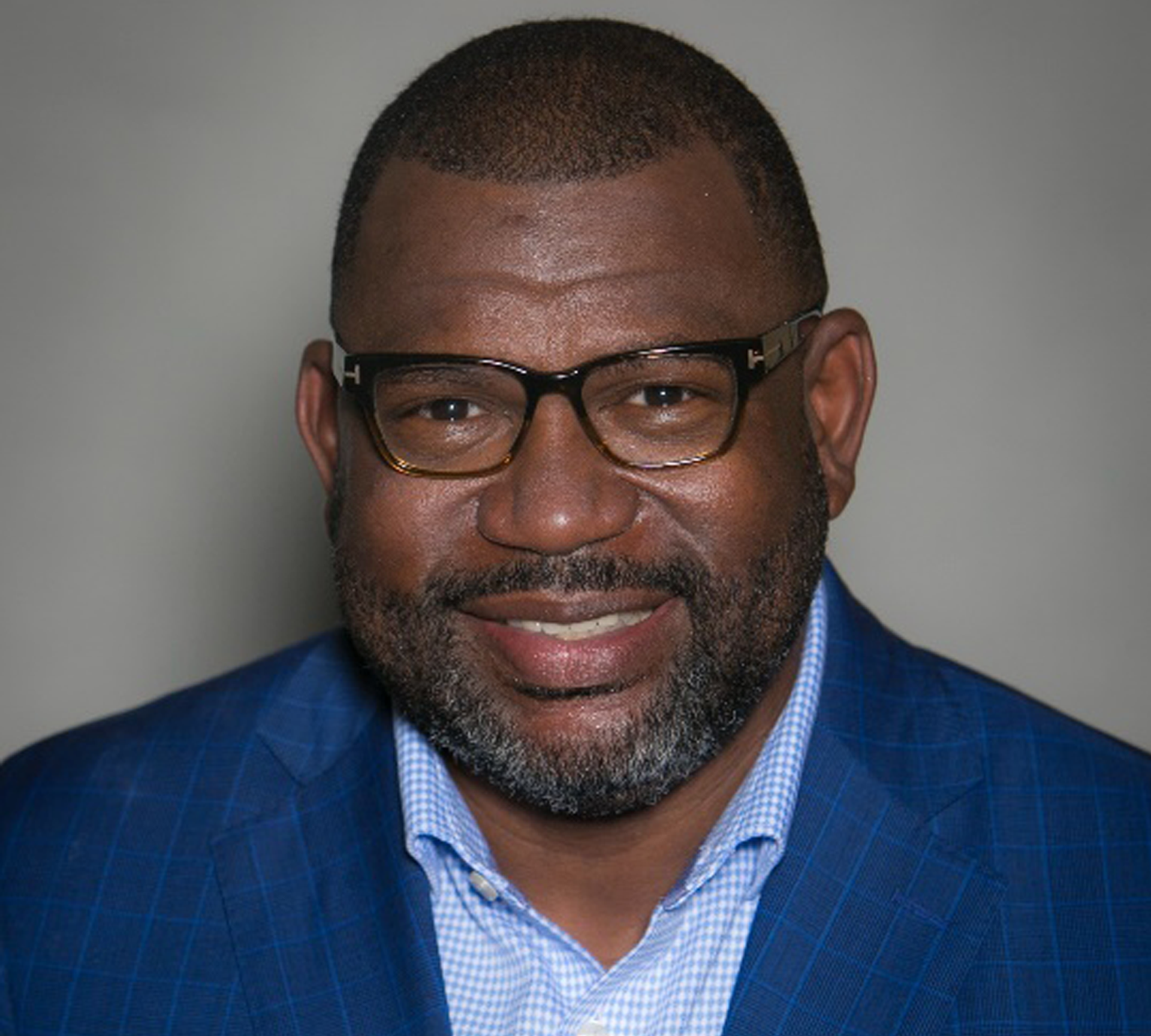Inland Empire News
Inland Empire News

By UBJ Staff
•
October 21, 2024
In an era where the lines between profit and purpose are increasingly blurred, businesses that focus on social entrepreneurship are transforming the way we think about community development. These ventures are designed not only to generate revenue but to address societal challenges in innovative ways. One such example is Care Staffing Professionals , a healthcare staffing company that contributes significantly to the social and economic resilience of underserved communities. By focusing on critical needs like healthcare access and job creation, this business model exemplifies how strategic entrepreneurship can build stronger, more resilient communities. Central to this mission is the involvement of the Lampkin Foundation , which helps amplify the social impact through community-focused initiatives and programs. Addressing Healthcare Needs in Underserved Areas Access to healthcare is a fundamental issue that disproportionately affects underserved communities. Many rural or economically disadvantaged regions face persistent shortages in healthcare staff, limiting their ability to provide adequate medical care. Care Staffing Professionals has stepped in to address this gap, providing healthcare facilities with the personnel they need to serve their patients. By supplying these essential workers, the company ensures that even the most vulnerable populations can receive the care they need, contributing to the overall health and stability of these communities. Beyond simply filling vacancies, the company adopts a strategic approach to ensure that its placements align with the needs of each facility and community. By focusing on areas where healthcare is most needed, Care Staffing Professionals helps reduce the disparities that often leave low-income populations with inadequate access to medical services. This approach also improves long-term health outcomes by creating a more stable healthcare infrastructure in areas that traditionally suffer from neglect. In doing so, the company plays a crucial role in fostering community resilience, ensuring that residents have access to consistent, quality healthcare. Economic Empowerment Through Job Creation Another significant way in which Care Staffing Professionals contributes to community resilience is through job creation. Employment is one of the most direct pathways to economic stability, and by creating jobs in the healthcare sector, the company provides individuals with opportunities for financial independence and career growth. Many of the positions offered through Care Staffing Professionals cater to individuals from underserved backgrounds, providing them with meaningful employment that offers not only a steady income but also the chance to develop new skills. These job opportunities are particularly impactful in economically disadvantaged regions where unemployment rates are often high, and career advancement opportunities are limited. By offering stable employment, the company helps lift individuals out of poverty and creates a ripple effect that strengthens the local economy. As more people gain access to steady jobs, local businesses benefit from increased spending power, further contributing to the economic resilience of the community. Additionally, the company prioritizes professional development, ensuring that its employees have access to training and resources that enable them to advance in their careers. This emphasis on growth fosters a cycle of empowerment, where workers are not only filling immediate job needs but are also building long-term careers. This model of job creation and development is key to fostering a resilient workforce that can adapt to changing economic conditions and continue contributing to their communities for years to come. Strengthening Community Ties Through Collaboration Social entrepreneurship often relies on collaboration to maximize its impact, and Care Staffing Professionals is no exception. The company works closely with healthcare providers, local governments, and community organizations to ensure that its efforts are aligned with the needs of the populations it serves. By engaging with stakeholders across various sectors, the company can tailor its services to address specific challenges within each community, whether that involves staffing shortages in hospitals or providing training programs for aspiring healthcare professionals. This collaborative model strengthens the social fabric of the communities served, building trust and cooperation among residents, healthcare providers, and other key stakeholders. As these relationships deepen, the communities become more resilient, better equipped to face future challenges, and more capable of sustaining long-term growth. Building a Sustainable Model for the Future One of the most compelling aspects of social entrepreneurship is its focus on sustainability. Unlike traditional businesses, which may prioritize short-term profits, companies like Care Staffing Professionals build their models around long-term social impact. By addressing healthcare needs and providing stable employment, the company creates a foundation for sustainable growth within underserved communities. The emphasis on sustainability also extends to environmental and social considerations. As healthcare providers become more integrated into these communities, they are better positioned to deliver preventive care, reducing the long-term strain on healthcare systems. Moreover, as residents become more economically empowered, they are more likely to invest in their own communities, fostering local development that benefits future generations. Through its efforts, Care Staffing Professionals demonstrates that social entrepreneurship is not just about addressing immediate needs but about creating the conditions for long-term resilience. This focus on sustainability ensures that the benefits of the company’s work will continue to be felt for years to come, contributing to a healthier, more economically stable future for underserved populations. The Power of Social Entrepreneurship The work of Care Staffing Professionals exemplifies the transformative power of social entrepreneurship. By addressing critical issues like healthcare access and economic empowerment, the company plays a vital role in building resilient communities. Through strategic collaboration, job creation, and a focus on sustainability, this business model offers a roadmap for how companies can make a lasting social impact while remaining financially successful. The involvement of foundations and community-focused initiatives further amplifies this impact, ensuring that community-driven programs remain at the forefront of the company’s mission. Together, these efforts demonstrate that social entrepreneurship is not just about doing good; it’s about creating sustainable, long-term solutions that empower individuals and uplift entire communities.

By Cherish H.
•
October 14, 2024
(Left to right) Rhonesia Perry - The Gentleman’s Society, Board Advisor, Crystal Anthony - The Gentleman’s Society, Committee Chair, Vanessa Tilford - SoCal Trades, President and Damien Halliburton - The Gentleman’s Society, President and CEO In an exciting new collaboration, the SoCal Trades Tour and The Gentleman’s Society have joined forces to bring career pathways and college opportunities to students across the San Gabriel Valley. This strategic partnership recently culminated in a five-day tour, reaching six high schools and impacting over 6,000 students, making a substantial impact on the future workforce. During the October 11th event hosted at South Hills High School, nearly 50 exhibitors engaged with students, providing hands-on insights into various career options. Among the exhibitors were key government agencies such as the FBI, Marine Corps, and Army recruiters, alongside local businesses within 15 miles of the school. The proximity of job opportunities allows students easy access. This powerhouse partnership between the Gentleman’s Society and SoCal Trades Tour will assist students in both their personal and professional development. Damien Halliburton, President and CEO of The Gentleman’s Society, highlighted the importance of this initiative for boys of color, who are often overlooked in traditional career outreach efforts. “This was an optimal opportunity for our organization to connect with young men who need guidance and support as they navigate both life and career decisions,” Halliburton said. His organization is dedicated to offering mentorship and professional development to help students build a solid foundation for future success. The tour drew attention from educational administrators, including a representative from Jurupa Valley Unified School District and Moreno Valley, who visited the event to observe its impact and explore opportunities for their districts. Vanessa Tilford, owner of SoCal Trades Tour, shared her enthusiasm for the event’s success and its potential for expansion. “We have the capacity for more exhibitors, and we are the first to leverage technology to connect students and businesses, making it easy to follow up and track each student’s progress,” Tilford explained. This innovative approach aims to help students maintain meaningful connections with employers and open doors for future opportunities. Together, SoCal Trades Tour and The Gentleman’s Society are eager to expand their reach across Southern California to continue fostering opportunities for students. For more information about becoming an exhibitor and how to schedule your school site; email info@gotgs.org . Feel free to visit www.socaltradestours.org and www.gotgs.org for more information. This event not only highlights the commitment to creating pathways for students but also reinforces the vital role that strategic partnerships play in shaping the future workforce throughout the SoCal region.

By Kim Anthony
•
October 3, 2024
Thrive Inland SoCal is an ambitious initiative born from a collaboration between the Inland Empire Labor Institute and Inland Economic Growth and Opportunity, two regional co-conveners dedicated to the region's inclusive and equitable development. The Inland Empire Community Foundation serves as the fiscal agent for this effort, managing the necessary responsibilities outlined by the State of California. Thrive Inland SoCal is driven by a mission to build a region where every resident has a voice in shaping the economic future while addressing the inequities that have historically plagued the area. Vision Thrive Inland SoCal envisions an Inland Empire where everyone, regardless of their background or circumstances, has access to the resources and opportunities necessary to thrive. This vision centers on fostering an inclusive economy that leaves no one behind. The Catalyst: California Jobs First Thrive Inland SoCal’s foundation was built on the momentum of the California Jobs First initiative, previously known as the Community Economic Resilience Fund (CERF). Created by the California Legislature, this program was designed to promote a sustainable and equitable recovery from the economic fallout of the COVID-19 pandemic. It supports new strategies to diversify local economies and develop sustainable industries that create high-quality, accessible jobs for all Californians. With approximately $600 million in competitive grants to be distributed among the state’s 13 regions from 2022 to 2026, California Jobs First represents a significant investment in regional economic development. Its potential to transform communities that have historically been under-resourced is immense, and Thrive Inland SoCal is at the forefront of leading this charge in the Inland Empire. A Future-Centered on People As the Inland Empire transitions toward a more technological, sustainable, and carbon-neutral future, Thrive Inland SoCal emphasizes the importance of centering its most valuable asset: its people. Originally launched as the Inland Empire High Road Transition Collaborative (IE-HRTC) with planning funds from California Jobs First, Thrive Inland SoCal is building partnerships and capacity to create an inclusive and prosperous future for the region. Thrive Inland SoCal is organized into five committees, six sub-regional tables, and an Equity Council, all designed to ensure that every resident has an opportunity to engage. Participation is open to anyone in the region, and residents are encouraged to join one or more of these groups to help shape the region's future. The Equity Council A cornerstone of Thrive Inland SoCal’s efforts is the Equity Council, which focuses on critical topics such as youth development, Native American tribal engagement, workers’ rights, women's issues, racial and social justice, environmental justice, and justice reform. The Equity Council meets every other Friday from 12 PM to 1 PM, with hybrid options to accommodate both in-person and virtual attendance. These meetings foster dialogue and action around the region's most pressing equity challenges. Meet the Thrive Inland SoCal Team Key leaders of Thrive Inland SoCal include: Esmeralda Vazquez, Director of Special Projects Chris Castorena, Partnership Development Manager Matthew Mena, Co-Executive Director Thrive Inland SoCal Events To build meaningful partnerships and foster collaboration, Thrive Inland SoCal hosts a variety of events. A central aspect of these gatherings is the opportunity for regional organizations to connect and collaborate on future project proposals. Here are some upcoming events: Catalyst Funding Round 2 Networking Mixer (In-Person) Date: Wednesday, September 25th, 12:00 PM - 1:30 PM Location: Inland Empire Labor Institute, 937 South Via Lata, Suite 500, Colton, CA 92324 Details: Attendees will have the chance to network, find potential project partners, and deliver a 1-2 minute elevator pitch about their organization or project. [Register Here] Catalyst Funding Round 2 Networking Mixer (Virtual) Date: Wednesday, October 2nd, 10:00 AM - 11:00 AM Details: A virtual opportunity to connect with other organizations and explore future partnerships. [Register Here] Technical Assistance Workshops Thrive Inland SoCal is offering two technical assistance workshops designed to help organizations navigate the Catalyst Funding application process: Workshop 1: Monday, September 23, 9:00 AM - 11:00 AM (Virtual) Workshop 2: Wednesday, October 9, 1:00 PM - 3:00 PM (Virtual) [Register Here] Both workshops will cover key strategies, project components, and a detailed breakdown of the application process. The Path Forward Thrive Inland SoCal is on a mission to transform the Inland Empire into a region where economic opportunity is within reach for everyone. With a dedicated team and a robust network of community partners, Thrive Inland SoCal is building the future of the region—one that is equitable, inclusive, and full of opportunity. Through events, networking, and strategic partnerships, the initiative is making strides toward a brighter future for the Inland Empire, with its people at the heart of every effort.

By Kim Anthony
•
September 27, 2024
Left to right: Mike Daniel (OCIE SBDC), Dr. Joy Sargis (Aleda), Tara Lynn Gray (CalOSBA) On April 25, 2024, the Orange County Inland Empire Small Business Development Center Network held four events in Irvine, Calif., each catered to serve a specific community. With more than 300 attendees, the day intersected clients, business owners, community members, lenders, government representatives, and partners to provide new opportunities, resources, and connections. Kicking off the morning, the SBDC Marketing Center presented Accelerate Growth: Marketing Strategies for the Digital Age. Center Director Roger Lloyd, in conjunction with consultants Gisele Haman and Rachel Svoboda, shared an engaging seminar of strategies and technologies designed to amplify financial success through live demonstrations, hands-on exercises, and case studies. Simultaneously, the Minority Business Summit showcased community, political, and economic development leaders throughout the county discussing the biggest issues facing minority small businesses today. Speakers included Christina Blevins of First 5 Orange County, Zitalic Domond of County of Orange, Vice President of Orange County Business Council Jess Ben-Ron, Governor’s Office of Business and Economic Development representative Christy Tran, Shela Tobias-Daniel of the State Treasurer’s Office, Orange County Hispanic Chamber of Commerce President and CEO Reuben Franco, Orange County Transportation Authority representative Ted Nguyen, and CEO of Small Business Diversity Network Jay Ungos. Attendees from all events converged for lunch, networking, and programming from a variety of partners, including CalOSBA Director Tara Lynn Gray, SBA representative Paul Smith, CSUF College of Business and Economics Dean Sridhar Sundaram, City of Irvine Mayor Farrah Khan, and Chris Johnson of Wells Fargo. The support and value provided by partners helps increase our reach throughout communities. Following lunch, the Southern California Lender Roundtable provided an engaging discussion on the current landscape of small business lending, including key updates on the state’s SSBCI funds and updates from the SBA. Speakers included SBDC Finance Center Director Sylvia Pizarroso, Allison French-Tubo and Shela Tobias-Daniel of the State Treasurer’s Office, OCIE SBA District Office representative Ron Galati, SBA Office of International Trade representative Pellson Lau, and D.C. SBA representative Alex Contreras. Concurrently, the Orange County Women’s Business Center hosted the Women Founders Pitch, in partnership with the OCIE SBDC, TCA Orange County, and Golden Seeds. The showcase of diverse and disruptive startups was riveting, as each founder was competing to win $2,500 toward their woman-founded business, Presenters included Erica Solis of Poppy Life Care, Wendee Close of Goals2Life, Dr. Joy Sargis of Aleda, and Remington Fraser of The Revury. Presentations were judged by Golden Seeds Angel Adriana Diener and TCA Orange County representatives Lisa Walker and Pat Hwang. Orange County Women’s Business Center Director Manal Richa shared the impact of the first-ever pitch competition. “This is an exciting convergence of innovation and empowerment. Our event ignited the entrepreneurial spirit of our OC community, drawing investors, judges, and public enthusiasts alike,” said Manal. “With the spotlight on four remarkable women-led ventures, each a beacon of diversity and disruption, our Women Founders Pitch illuminated the path to progress and the limitless potential of female founders and women in business.” Ultimately, Dr. Joy Sargis took home the $2,500 prize for her small business Aleda, a platform for student athletes, high schools, colleges, and professional athletes to monetize their name, image, and likeness by creating Certified Digital Assets. The remaining three participants received an award of $1,000 each. The day provided new outlets for clients, partners, and audiences to connect, grow, and expand their knowledge and businesses. The OCIE SBDC’s service to the community and resources are made possible by funding partners CalOSBA and SBA. OCIE SBDC Network Director Mike Daniel shared the overall impact as the day culminated. “The events held on April 25 were a great opportunity for the OCIE SBDC to bring together business owners, business leaders, chambers of commerce, economic development leaders, lenders, and more to find new solutions to helping our small business community grow and thrive. The SBDC will continue to find new and innovative ways to educate and inform small business owners and those that support them with the resources they need to succeed.”

By Kim Anthony
•
September 27, 2024
The highly anticipated 16th annual Connecting Faith & Business Summit is scheduled for October 17, 2024, at the prestigious DoubleTree by Hilton Hotel Ontario Airport. The event promises to bring together business owners, entrepreneurs, and faith-driven leaders for a day of inspiration, motivation, and values-based networking. Event Details: Date: October 17, 2024 Location: DoubleTree by Hilton Hotel Ontario Airport Websites: ampac.com | connectingfaithandbusiness.com With check-in starting at 8:45 a.m., attendees will experience the power of connection in an environment designed to foster collaboration and growth. The summit serves as a prime opportunity for business owners to unlock new avenues for success, find inspiration, and cultivate meaningful relationships that can shape the future of their ventures. The Connecting Faith & Business Summit has established itself as a premier event for professionals seeking to align their faith with business practices. Attendees will benefit from a full day of engaging sessions, networking opportunities, and motivational speeches aimed at empowering individuals to make 2024 a year of exponential growth and success. "At a time when connection and collaboration are more critical than ever, this summit offers attendees the chance to be educated, inspired, and connected like never before," event organizers said. The summit's focus on values-driven networking creates an environment where faith and business converge, enabling participants to foster relationships that can have a lasting impact on their professional journeys. To learn more about the summit and secure a spot, interested individuals are encouraged to visit ampac.com or connectingfaithandbusiness.com .

By Kim Anthony
•
September 21, 2024
(Fontana, Calif. - September 20, 2024) - Did you miss Fontana's Business Summit, don't worry - we've got a recap of all the valuable insights at the event! Held at Spaggi’s Event Center, the summit brought together business owners, entrepreneurs, and visionaries to explore strategies for scaling businesses, building creditworthiness, securing government contracts, and expanding into brick-and-mortar locations. Mayor Acquanetta Warren opened the event with a warm welcome, sharing her excitement for Fontana’s business community. She reminded us of the city’s commitment to supporting growth, saying, "Fontana is more than a city – it’s a community where businesses come to thrive." San Bernardino County Supervisor Jesse Armendarez echoed this sentiment, stating, "If you are an entrepreneur and are willing to invest in your business, Fontana is the place to be." The summit featured industry experts like Dennis Yu, a pioneer in social media marketing and co-author of "The Definitive Guide to TikTok Advertising: How to Access 1 Billion People in 10 Minutes!", who shared actionable strategies for leveraging social media to grow networks and build meaningful community relationships. Catherine Smith Licari, Founder and CEO of Cashflow for Creatives, introduced her product, The Small Business Planner, a tool designed to help businesses build a solid financial foundation. She emphasized the value of brick-and-mortar stores, saying, "Opening a storefront creates an experience for your community." Business Summit attendees had the opportunity to meet other business owners, receive on site assistance to apply for the Fontana Empowerment Loan Fund and enjoyed lunch from local Fontana restaurant, La Tapatia. Business Summit attendee and business owner Taylor Gonzalez stated "I've never been to a business development event that was worth my time than the Fontana Business Summit. Speaker after speaker, panel after panel, everyone delivered invaluable information and offered solutions to real world problems we as business owners are facing. I left feeling empowered, inspired and motivated to implement the tools I learned from the summit, and I look forward to the next one!"

By Kim Anthony
•
August 23, 2024
San Bernardino Allocates $1 Million to Support Local Businesses with Facade Improvement Grants Starting Monday, August 26, the City of San Bernardino will begin accepting applications for the "Paintbrush Program," a new initiative aimed at revitalizing commercial corridors by providing grants ranging from $10,000 to $20,000 to local businesses for facade improvements. The program covers a variety of enhancements such as new exterior signs, awnings, canopies, fresh paint, stucco, tile, brick repairs, paving, outdoor lighting, windows, architectural details, landscaping, irrigation, and even fountains. "This is a great opportunity to beautify our commercial corridors while helping local business owners invest in their properties," said San Bernardino Economic Development Director Ken Chapa. Funded with $1 million from the American Rescue Plan, the program will operate on a first-come, first-served basis. Businesses that opened before March 2020 can receive up to $20,000, while those that opened after that date are eligible for up to $10,000. Participants must have a valid City of San Bernardino business license and complete a mentoring session with the Small Business Development Center. All improvements must enhance the exterior appearance of the business and be visible from the street. Eligible businesses are located along the following corridors: Downtown San Bernardino Mt. Vernon Avenue (Highland Ave. to Mill St.) E Street (30th St. to Mill St.) Waterman Avenue (Highland Ave. to Mill St.) 40th Street/E Street (Little Mountain Dr. to 31st St.) Highland Avenue (Macy St. to Mt. Vernon Ave.) Highland Avenue (Victoria Ave. to Boulder Ave.) 5th Street (Rancho Ave. to Victoria Ave.) Base Line Street (Meridian Ave. to Mt. Vernon Ave.) Base Line Street (215 Freeway to Victoria Ave.) Redlands Boulevard (Waterman Ave. to Gage Canal) For more information, including how to apply, visit www.SBCity.org/PaintbrushProgram . For questions, contact the Economic Development Department at (909) 384-5366 or email EconDev@SBCity.org .

By Kim Anthony
•
March 8, 2024
Spectrum has appointed Wally Bakare as the new Regional Vice President of Field Operations for its West Region, which includes the company’s cable systems serving customers in Southern California, Hawaii, and Arizona. Bakare will report to Shannon Atkinson, recently promoted to Senior Vice President of Field Operations, who oversees multiple regions. Bakare will be based in El Segundo, marking his return to Southern California. In his new role, Bakare will lead the West Region’s Field Operations team, which consists of 4,000 employees. This includes field technicians responsible for installations and service calls for residential and small to medium-sized businesses. His team also oversees the monitoring, maintenance, construction, and upgrades of local broadband networks. These efforts will support Spectrum’s network evolution, which aims to deliver symmetrical and multi-gigabit speeds across the company’s 41-state service area, as well as expand the network further. “Wally’s extensive 25-year career in the industry is defined by his commitment to improving organizational performance in all aspects of Field Operations,” said Atkinson. “His exceptional ability to identify operational gaps and create effective strategies will enhance performance and improve the experience for millions of Spectrum customers in Southern California, Hawaii, and Arizona.” Since August 2021, Bakare has served as Regional Vice President of Field Operations for Spectrum’s Northwest Region, which covers operations in Colorado, Idaho, Montana, Nevada, Oregon, Washington, Wyoming, and Central and Northern California. Previously, he spent five years in the West Region as Area Vice President for the SoCal Central management area, serving communities in Los Angeles and Orange County. Bakare began his telecommunications career in 1996 with Nextel Communications and later spent seven years at Comcast in various broadband and telephony leadership roles. He joined Time Warner Cable in 2006, where he held leadership positions in telephony and operations in Southern California and Ohio. He transitioned to Charter in 2014 as Area Vice President for its California management area. Bakare holds a master’s degree in Telecommunications Management from the University of Maryland University College and is a graduate of Harvard University’s Cable Executive Management Program.

By Kim Anthony
•
February 23, 2024
For Tara Lynn Gray, Director of the California Office of the Small Business Advocate (CalOSBA), entrepreneurship has been a guiding force throughout her life. Her advocacy for small businesses stems not from academic studies, but from a deeply personal connection to her family's small business legacy. As a young girl, Tara watched her grandmother uplift Black women by styling their hair, instilling both confidence and a sense of empowerment. This firsthand experience of seeing the impact small businesses can have on individuals and communities has always stayed with her. Now, as a vital partner of Small Business Majority, Tara serves as a champion for the dreamers and risk-takers who form the backbone of communities across California, including the Inland Empire. In a recent conversation, she shared insights about her work at CalOSBA, what entrepreneurs can expect when they connect with a CalOSBA advisor, and the array of resources and community support available to help foster entrepreneurship across the state. In a interview with By Josaline Cuesta, California Program Director, Small Business Majority, Gray has the following response: Tell us about CalOSBA’s role in the small business community. “California has the biggest small business community in the country, accounting for 4.1 million small businesses in 2023 alone. The overwhelming majority have no employees at all, except themselves, which means they don’t have a Board of Directors, expensive consultants, and they definitely don’t have lobbyists. I take my role as their advocate seriously, talking with and listening to small business owners from up and down the state. During the pandemic, we were under a very bright spotlight, administering nearly $5 billion in direct relief funding and we’re proud of the grant programs we still oversee. But that’s only a small part of what we do at CalOSBA. My team connects small business owners to information and resources to help them get started, manage their business and, most importantly, to grow. If they’re looking for help, we want to be the first door they knock on. In addition, we offer Outsmart Disaster training , which focuses on how to mitigate risks associated with natural disasters and recovery avenues available to them. I always say the flagship of our office is our support for the statewide network of Small Business Centers, providing 1:1 business assistance and training for small business owners of all industries and in dozens of languages. In addition, supporting partners that deliver these services–all the federally funded centers like the Small Business Development Centers and the Women’s Business Centers but also Chambers of Commerce and other nonprofits—is a core function of my office. And a big source of pride because we know what a difference they make for their clients.” What can small business owners expect from meeting with a California Small Business Center advisor? “Small business owners can expect to meet someone who is fully invested in them. Our Centers cover the full spectrum of business needs, from writing a business plan and obtaining the right permits and licenses, to finding capital, planning a succession strategy and marketing to e-commerce. Our business advisors provide the experience and the objective perspective to help business owners optimize their best assets: ideas, energy, and ability to keep adapting and learning. And they do it because they love helping other people succeed. What’s more, business ownership can become isolating and it may be challenging for entrepreneurs to find assistance. But they don’t have to go at it alone–and they shouldn’t, when these no-cost and low-cost services are available to them.” What’s the most rewarding part of your role at CalOSBA? “I always say I have the best job in the state. And it’s because I frequently have the honor to watch someone’s dream come true. I love a ribbon-cutting ceremony–Every time, big or small. It means someone dreamed of accomplishing something and worked hard for it: They opened the doors to their business, they made a sale, and hopefully they will hire their first employee and then it’s off to the races. But no matter what happens to that business, that ribbon-cutting is a milestone they made happen for themselves. There are many other events I get invited to, where you can just see the hope and pride, and even fear in their faces. I’m often overwhelmed by the sheer emotion of it, and I’m always humbled that I get to participate in that person’s big milestone.” What are some new programs that can benefit small business owners in the Inland Empire? “The number one question my office gets asked is how to access small business financing. To help address this key need, we’re launching the Technical Assistance for Capital Readiness program this February. The program is part of a bigger effort to fill well-known funding gaps in the state to benefit very small businesses and Socially and Economically Disadvantaged Individuals (SEDI). Through investments from the U.S. Treasury, the State Treasurer’s Office and IBank, the program is going to support lenders to facilitate “high risk” loans that they normally would not approve. In addition to supporting lenders, my office also received $25.3 million in U.S. Treasury funding to start the new Capital Readiness network. The Capital Readiness Coaches in this network will help business owners get ready for the lending marketplace, help them make the best choices in a high interest-rate environment, and optimize the use of the capital once they receive it. The network is also designed to help spread the word about this opportunity to these SEDI-owned businesses, and some of those partners will be focused on supporting the Inland Empire small business ecosystem.” How can business owners get in touch with CalOSBA? “That’s simple! Check out calosba.ca.gov and sign up for our monthly newsletter, where I write a column and showcase success stories from our network, along with deadlines and updates on grant and workforce support programs. We’re also on social media, so I would encourage business owners to check out all of our channels.”

By Kim Anthony
•
February 2, 2024
The California African American Chamber of Commerce hosted its second annual “State of the California African American Economy Summit” from January 24 to January 25 at the Westin Los Angeles Airport Hotel. The summit aimed to bolster Black economic influence through education and fellowship, bringing together some of the state’s most influential Black business leaders, policymakers, and economic thinkers. Discussions focused on various economic topics pertinent to California’s African American business community, including policy, government contracts, equity, and more. Toks Omishakin, Secretary of the California State Transportation Agency (CALSTA), attended the event and spoke to attendees about his department’s efforts to increase access for Black business owners. He highlighted initiatives and programs to enhance opportunities and support for Black entrepreneurs in the transportation sector. Lueathel Seawood, the president of the African American Chamber of Commerce of San Joaquin County, candidly shared her frustration with the challenges small businesses face in obtaining federal contracts and completing the certification process. She noted that once a small business was certified as a Disadvantaged Business Enterprise (DBE), there was little assistance available to help them progress to the next step. Toks Omishakin acknowledged that more work is needed to help small businesses complete the process and be included in upcoming projects. He mentioned that the California High-Speed Rail Authority’s high-speed rail system expansion has set a goal of 30% participation from small businesses, but only 10% is specifically set aside for DBEs. The importance of Diversity, Equity, and Inclusion (DEI) in economics was reinforced during the “State of the California Economy” talk, led by author and economist Julianne Malveaux and Anthony Asadullah Samad, Executive Director of the Mervyn Dymally African American Political and Economic Institute (MDAAPEI) at California State University, Dominguez Hills. Malveaux emphasized that assaults on DEI disproportionately affect women of color and Black women. When asked about the potential role of the loss of DEI in economics, she suggested that there might be a more sinister purpose behind these attacks, hinting at the intentional marginalization of these groups to maintain systemic inequalities and hinder their economic progress. The most anticipated speaker at the event was Janice Bryant Howroyd, affectionately known as “JBH” to her peers. She is among the first Black women to run and own a multi-billion-dollar company. Her company, ActOne Group, is one of the world’s largest and most recognized hiring, staffing, and human resources firms. Howroyd is also the author of “Acting Up” and has a profile on Forbes. Timothy Alan Simon, Chairman of the Board of Directors of the California African American Chamber of Commerce, a lawyer, and the first Black Appointments Secretary in the Office of the Governor of California, moderated the discussion. Together, they explored the state of Black entrepreneurship in the country, with Howroyd offering advice to other business owners.
